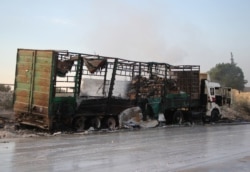On July 11, the United Nations Security Council voted to extend cross-border humanitarian aid to Syria for another year. Russia and China had vetoed earlier resolutions to extend the cross-border aid, before finally abstaining from the July 11 vote. Twelve countries, including the United States, voted in favor of the resolution.
Under the new agreement - which was a compromise after Russian and Chinese opposed previous resolutions - only one authorized border crossing for aid will remain: Bab al-Hawa, on the Syrian/Turkish border. A Russian proposal in January closed two cross-border entry points for aid.
Bab al-Hawa borders Syria’s Idlib governorate, which is mainly controlled by the Syrian opposition. The Turkish military maintains observation posts there. That means that the Assad regime in Damascus, whose forces are still fighting rebel groups on the Idlib front, can’t influence distribution of humanitarian aid in the area.
On July 15, Russia’s Foreign Ministry released a statement regarding the new arrangement under U.N. Resolution 2533. It read, in part:
“We would like to point out that Russia has always advocated the delivery of humanitarian aid to all those in need throughout Syria in strict compliance with the norms of international humanitarian law. The guidelines for the delivery of humanitarian aid formalised (sic) in UN General Assembly Resolution 46/182 say clearly that it should be provided with the consent and on the basis of an appeal by the affected country and based on respect for its sovereignty, territorial integrity and national unity.”
Although partly factual, the statement is misleading.
UNGA Resolution 46/182, adopted in 1991, does state that humanitarian aid should be “provided with the consent of the affected country,” and that “the sovereignty, territorial integrity and national unity of States must be fully respected in accordance with the Charter of the United Nations.”
However, the Russian statement ignores one of the resolution’s 12 twelve principles, which states: “Humanitarian assistance must be provided in accordance with the principles of humanity, neutrality and impartiality.”
In fact, the Assad regime has been credibly accused of manipulating the distribution of humanitarian aid in order to further its strategic goals in the war.
The Guardian newspaper reported in 2016 that the Assad regime not only decided who could receive humanitarian aid via the U.N., but also had control over what organizations the U.N. could work with and what specific items could be delivered.
In some cases, Syrian government troops blocked humanitarian aid convoys to stop relief from getting to opposition held areas. One of the most egregious cases was the Syrian air force’s September 2016 bombing of a U.N. humanitarian relief convoy near the then besieged city of Aleppo.
Such actions go against Resolution 46/182’s principle of neutrality and impartiality. They also arguably violate point four of the resolution’s principles, which states:
“Each state has the responsibility first and foremost to take care of the victims of natural disasters and other emergencies occurring on its territory.”
It could be argued that the Assad regime cannot adequately adhere to this principle in territory controlled by armed opposition. However, the regime has at times selectively allowed aid to reach such areas.
The text of Resolution 46/182 refers to natural disasters and other “emergencies,” but says nothing about civil wars, let alone one like the Syrian civil war, in which the government rapidly lost control over large swaths of territory.
The humanitarian situation facing Syria is critical.
David Beasley, head of the United Nations World Food Program, said on June 29 that more than 1 million Syrians were “food insecure.” He warned that without relief, there would either be another mass exodus of refugees from the country or mass starvation.
Beasley added that the regime in Damascus should ensure that humanitarian aid gets to all who need it, including those outside of government-controlled areas.
